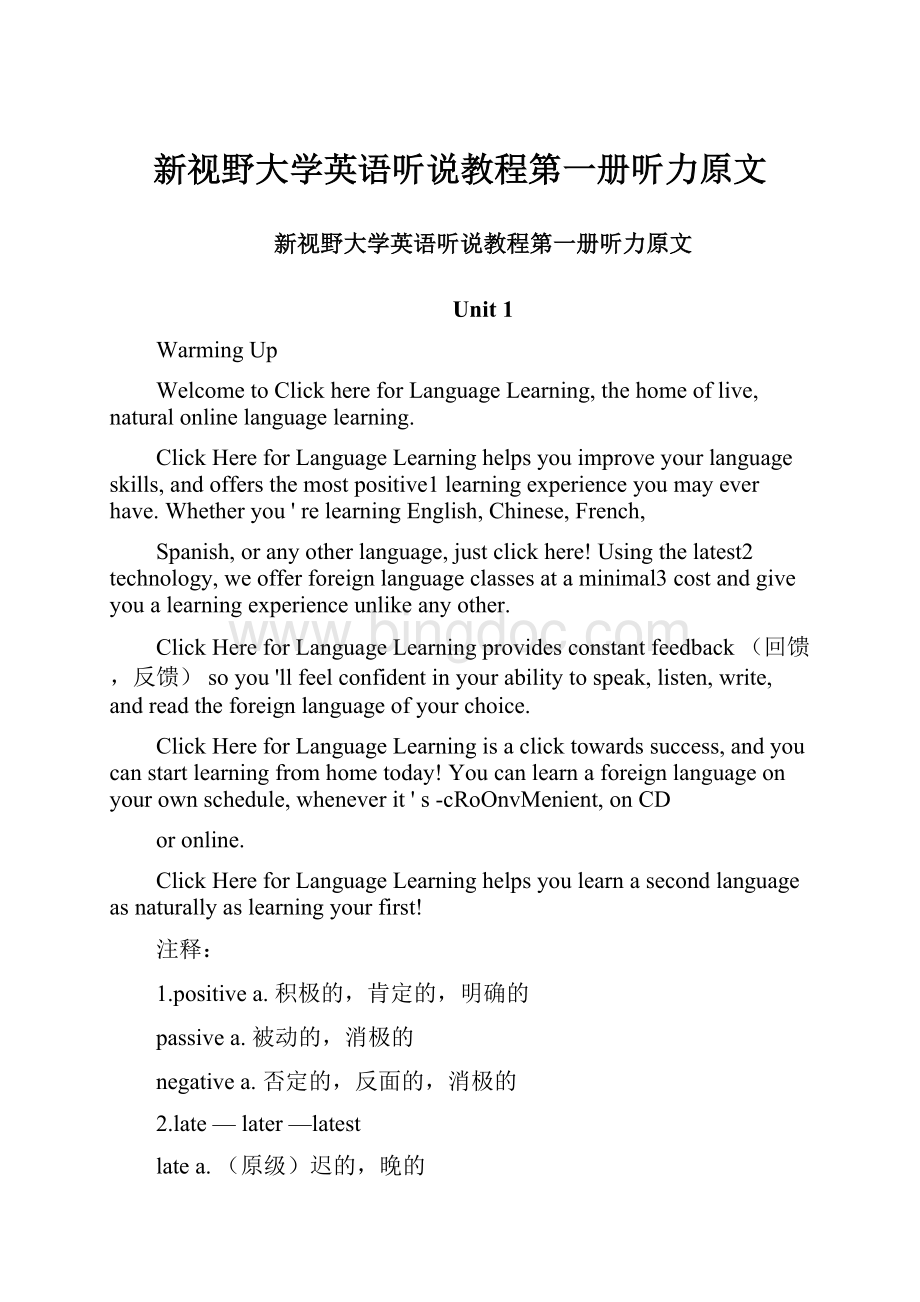新视野大学英语听说教程第一册听力原文.docx
《新视野大学英语听说教程第一册听力原文.docx》由会员分享,可在线阅读,更多相关《新视野大学英语听说教程第一册听力原文.docx(62页珍藏版)》请在冰点文库上搜索。

新视野大学英语听说教程第一册听力原文
新视野大学英语听说教程第一册听力原文
Unit1
WarmingUp
WelcometoClickhereforLanguageLearning,thehomeoflive,naturalonlinelanguagelearning.
ClickHereforLanguageLearninghelpsyouimproveyourlanguageskills,andoffersthemostpositive1learningexperienceyoumayeverhave.Whetheryou'relearningEnglish,Chinese,French,
Spanish,oranyotherlanguage,justclickhere!
Usingthelatest2technology,weofferforeignlanguageclassesataminimal3costandgiveyoualearningexperienceunlikeanyother.
ClickHereforLanguageLearningprovidesconstantfeedback(回馈,反馈)soyou'llfeelconfidentinyourabilitytospeak,listen,write,andreadtheforeignlanguageofyourchoice.
ClickHereforLanguageLearningisaclicktowardssuccess,andyoucanstartlearningfromhometoday!
Youcanlearnaforeignlanguageonyourownschedule,wheneverit's-cRoOnvMenient,onCD
oronline.
ClickHereforLanguageLearninghelpsyoulearnasecondlanguageasnaturallyaslearningyourfirst!
注释:
1.positivea.积极的,肯定的,明确的
passivea.被动的,消极的
negativea.否定的,反面的,消极的
2.late—later—latest
latea.(原级)迟的,晚的
latera.(比较级)更迟的,更晚的
lattera.(位于the,this,these后)后面的;〔thelatter〕后者
latesta.(最高级)最迟的,最晚的,最新的
3.minimala.最小的,最低的
minimizevt.使…成极少,减到最少
minimumn.最少
maximizevt.把…增大(扩大)至U最大限度
maximumn.最大量,最高值
UnderstandingShortConversations
Nowyouwillheartenshortconversations.Aquestionwillfolloweachconversation.Listencarefullyandchoosethebestanswerfromthefourpossiblechoices.
1.W:
IsawanadontheInternetaboutonlinelanguagestudies.
M:
Metoo.Isawanadfor,“ClickHereforLanguageLearning”.
Q:
Whatdothemanandthewomanhaveincommon1?
B
2.M:
Youhavetobe18yearsoldtoentersomeonlinelanguageclasses.
W:
Really?
Ihadnoideathattherewasaminimumagerequiredforsomeclasses.
Q:
WhatdidthewomanNOTknowaboutonlinelanguageclassesbefore?
C
3.M:
Unlikeregularclasses,onlineclassescanbetakenatyourhome.
W:
That'sexactlywhyIdecidedtobeginstudyingonline!
Q:
Whydidthewomandecidetostudyonline?
A
4.W:
Ikeeponmaking2newfriendsasIstudyonline.
M:
SodoI!
Therearesomanypeopleonline,andIwanttomeetthemall!
Q:
Whatisonebenefitofstudyingonline?
C
5.M:
Myonlineteacheraskedtheclassforsuggestionstomaketheclassbetter.W:
That'sgreat!
Ialwayslikeitwhenateacherdoesthat.
Q:
Whatdidtheman'steacherwantto?
doD
6.M:
Ihadnoideathatonlinelanguagelearningcouldbesoeffective!
W:
Itsurehashelpedmepracticemylanguageskills!
Q:
Whatisitaboutonlinelanguagelearningthatsurprisedtheman?
C
7.M:
MyclassmatesandIhelpeachothersolvehomeworkproblemsonline.W:
Itsoundslikeyou'reusingtheInternetinausefulway.
C
'thavettoimsechtootrl.avel
A
Q:
Whatdoesthemandoonline?
8.M:
Onlinelearningisidealforanyonewhodoesn
W:
Yes,butitalsohasitsownchallenges.
Q:
Whatdoesthewomanhavetosayaboutonlinelearning?
9.M:
Virtualclassroomarechanginghowstudentsstudy!
W:
Theysureare!
AndI,forone,amveryexcitedaboutit.
Q:
Accordingtotheman,whatishappeningtostudentsbecauseofvirtualclassrooms?
10.M:
Whatadvicedidyourprofessorgiveyou?
W:
Hesaidthattakinganonlineclasswouldhelpmelearn.
Q:
Whatdidthewoman'sprofessorsuggest?
D
注释:
1.havesth.incommon在…有共同点
havemuchincommon在...有很多共同点
havenothingincommon在…没有共同点
2.keepondoing继续做,坚持做
keepsb.on继续雇用某人
keeponaboutsth.继续谈论某事
keeponatsb.不断地向某人提出请求不断地抱怨(纠缠,困扰)某人
UnderstandingaLongConversation
Nowyouwillhearalongconversationfollowedbyfivequestions.Listencarefullyandchoosethebestanswerfromthefourpossiblechoices.
W:
How'syournewonlineclass,Bill?
Isiteverythingyouhadhopedfor?
M:
It'severythingandmore,Susan.Youshouldgiveitatry!
W:
Oh,really?
What'sthebestthingaboutit?
M:
Inanonlineclass,youtalkwithothersovertheInternet.Sincetheyarenotrightnextto1you,theydon'tbotheryousomuch.
W:
Thatsoundsgreat!
ItookaclasswithsomeonewhowouldmakemefeelsmallwheneverImadeamistake.HewouldtellmehowstupidIwasandintimidate(威胁,恐吓)mesothatIneverwantedtoparticipate.
M:
Notaprobleminthevirtualclassroom.Howwouldyouliketosignup2?
Ithinkthatyoucouldstartonthethirdofnextmonth.
W:
Idon'tknow,Bill.Youknowallthoseproblemsabouthavingdifficultpeopleintheclassroom?
M:
Yeah?
W:
Wedon'treallyhavethemanymoresinceyouleft.
1.WhichofthefollowingisNOTtrueaboutBill?
A
2.AccordingtoBill,whyareotherstudentsNOTaconcerninanonlineclass?
B
3.WhydidSusanNOTliketoparticipateinclass?
B
4.WhencouldSusanstartstudyingonline?
D
5.WhydidSusanNOTmakeuphermindtojoinonlineclass?
A
注释:
1.next:
a.其次的,紧接的
nextto1)仅次于2)靠近,贴近
2.sign:
n.记号,符号;预兆,迹象;标记,牌子
vt.签名;做手势,打信号
signin签到;记录某人到达的时间
signout用签名的办法记录某人离开的时间
signup签约参加工作(或组织,活动等)
UnderstandingaPassage
Nowyouwillhearapassagefollowedbyfivequestions.Listencarefullyandchoosethebestanswerfromthefourpossiblechoices.
Thefirstrequirementformyonlinelanguageclasswastomeetinanonlineforum(论坛).Ientered
theforumearlyandsawstudentsappearonthescreenoneafteranother.Strangelyenough,whenitwastimetobegin,theteacherstillhadn'tshownup1.However,webegansharinginformationandtalkingaboutthenewclass.Unlikeme,alloftheotherstudentswerenewtotheonlineclass.Itold
themaboutmyexperienceandmythoughts.ThenInoticedsomething.Therewere27peopleintheforum.ThiswasstrangebecauseIknowtherewereonly26peopleintheclass.
“Hey,”Iwrote,“whichoneofyouistheteacher?
”
Theteachermadeherselfknownatlast.Shesaidthatshewantedtogetourhonestopinionsabouttheonlineclass.Also,shewantedtohavealittlefunwithus.“Humorwillbeimportantinmyclass,”shesaid.
1.Whatwasthefirstrequirementoftheonlineclass?
A
2.Whatwasstrangeaboutthebeginningoftheonlineclass?
A
3.Howweretheotherstudentsdifferentthanthespeaker?
C
4.Whatdidthespeakernotice?
D
5.WhydidtheteacherNOTmakeherselfknowntotheclassatfirst?
D
注释:
1.show:
vt.展示,显示;露出;展出,陈列;
n.展示,展览;演出
showup揭露,拆穿;显眼,露出;出席,到场
showoff炫耀,卖弄;使显眼
Homework
SupplementaryListening
Task1
Nowyouwillhearalongconversationfollowedbyfivequestions.Listencarefullyandchoosethebestanswerfromthefourpossiblechoices.
M:
Allright,everyone.Goodwork.That'sallfortoday'sclass.Doesanyonehaveanyquestions?
W:
Excuseme,Professor.Ihaveaquestion.I'mworriedaboutmyEnglishskills.Igetgoodmarksontests,butIdon'tfeelthatI'mlearningalot.
M:
Notexactlyaquestionisit,Winnie?
Butit'sagoodconcern.ManyadvancedEnglishlearners
havealarge“passivevocabulary”b,uttheyworryabouttheir“activevocabulary”T.heycanunderstandmanydifficultEnglishwordswhenreadingorlistening,buttheydon'tusemostofthem
whenspeakingorwritinginEnglish.Theyfeelthisisaproblem.Theywouldliketouseallthedifficultwordsthattheyknow.
W:
DoyouthinkthatIusetoofewwords?
M:
That'snotwhatI'msayingatall.Actually,I'msayingtheoppositething.
W:
I'mafraidIdon'tunderstand.
M:
Inyournativelanguage,therearealsothousandsofwordsthatyouunderstandbutyoudon't
use.Soyouractivevocabularyinyournativelanguageismuchsmallerthanyourpassivevocabulary.AndIguessthatyouarenotworriedaboutthat.
W:
No,I'mnot.ButIwouldliketousethenewwordsthatIlearninmyEnglishclasses.Howelse
amIgoingtorememberthem?
M:
Nowthat'saverygoodquestion.
W:
Iwashopingthatyouhadananswertothisquestion.
M:
Winnie,youdon'tneedtoworryaboutusing“toofew”Englishwords.Asyourneedsfordifferentthingsgrow,youwillbeabletouseyournewwordsmoreandmore.Ithinkyou'dbesurprisedbyhowmuchyouknow.
W:
Soyouradvicetomeis“Don'tworry.”?
NowI'mworriedthatI'mpayingtoomuchforschoo
1.Whoarelikelytoworryabouttheiractivevocabulary?
D
2.Whatis“activevocabulary”accordingtotheprofessor?
D
3.WhatdomanyEnglishlearnerswanttodo?
A
4.Whatdoestheprofessorsayaboutvocabularyinone'snativelBanguage?
5.WhatdoestheprofessorwanttotellWinnie?
D
Task2
Nowyouwillhearapassagefollowedbyfivequestions.Listencarefullyandchoosethebestanswerfromthefourpossiblechoices.
ThebiggestproblemmostpeoplefaceinlearningEnglishistheirownfear.Theyworrythattheywon'tsaythingscorrectlysotheydon'tspeakEnglishatallt.hDiso.nDon'tl'ettadliottlefear
stopyoufromgetting1whatyouwant.
ThebestwaytolearnEnglishistosurroundyourselfwithit.ThemoreEnglishmaterialyouhavearoundyou,thefasteryouwilllearnandthemorelikelyyouwillbeginthinkinginEnglish.
MusiccanbeaveryeffectivetooltolearningEnglish.Thebestwayistousethelyrics(歌词)andtry
toreadthemastheartistsings.Thiswayyoucanpracticeyourlisteningandreadingatthesametime.
WatchingEnglishmoviesisnotonlyfunbutalsoveryeffective.BywatchingEnglishmovies,youcanexpand2yourvocabularyandlearnthenaturalflowsofspeechfromactors.
1.WhatisthebiggestproblemthatmanyEnglishlearnershave?
B
2.WhydosomeEnglishlearnersNOTspeakEnglishatall?
B
3.WhatisthebestwaytolearnEnglishaccordingtothespeaker?
D
4.WhatisthebestwaytolearnEnglishthroughmusic?
A
5.HowcanyoubenefitfromwatchingEnglishmovies?
C注释:
1.stopsb.fromdoing
keepsb.fromdoing阻止某人做某事preventsb.from